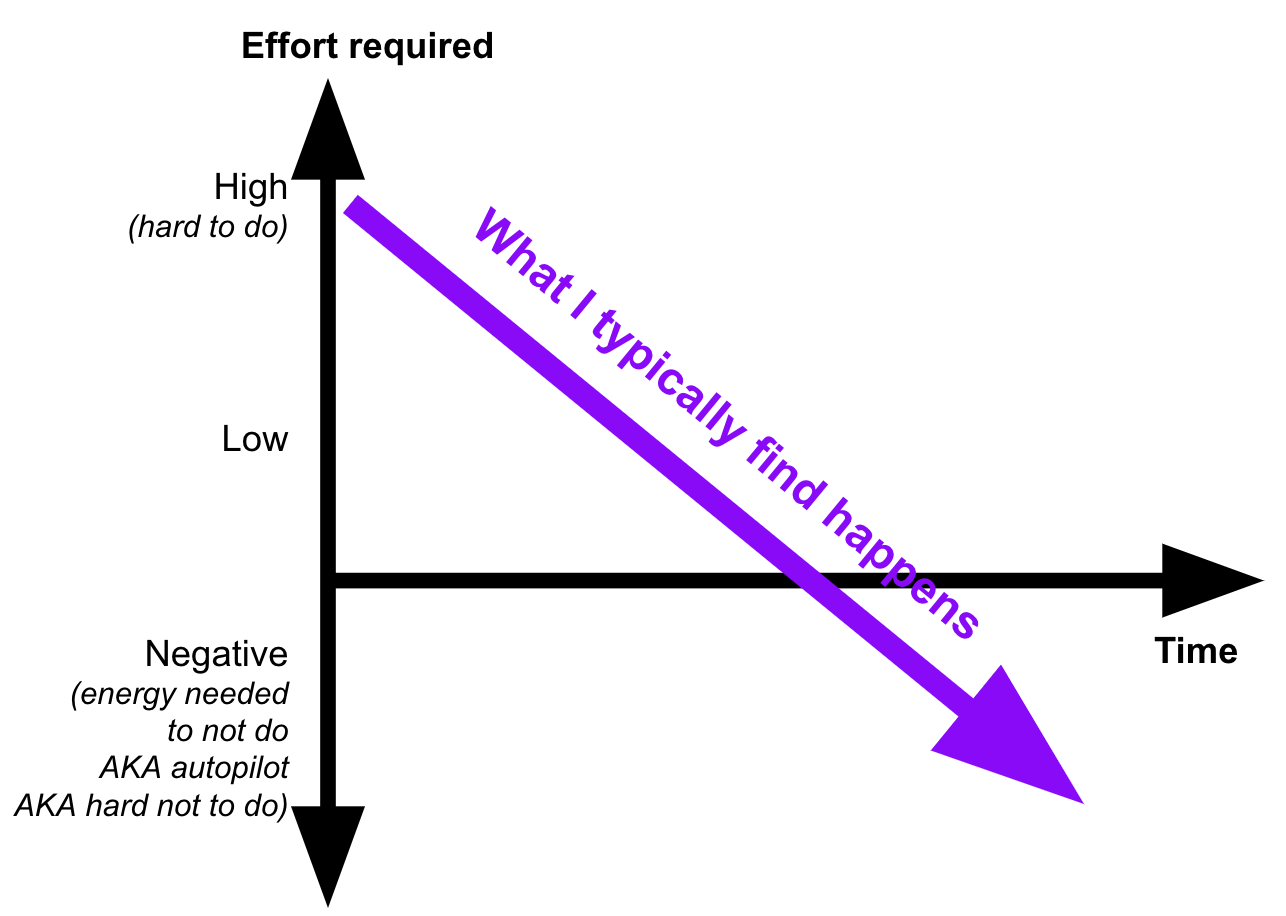Habits - accumulated momentum
/By Duncan Anderson. To see all blogs click here.
Reading time: 4 mins
Summary: Momentum is an incredibly powerful tool... just as inertia is an incredibly powerful force. For me, in many respects, habits are ‘accumulated momentum’.
First you make your habits, then your habits make you.
If I want to build a ‘habit’ I just start doing. Typically I find it super hard to do the ‘habit’ at the beginning but then it gets to the point where the ‘habit’ is super hard not to do.
What is hard on the beginning, is not just easy in the end, it's on autopilot. It’s hard not to do the habit! In Psychology this is called ‘automaticity’.
“We are what we repeatedly do. Excellence, then, is not an act, but a habit”. (Will Durant, paraphrasing Aristotle)
Jingle: make something go from hard to do to hard not to do.
I’ve tried to set up my life to have activities I do being on ‘autopilot’. Eg exercise, writing, work, relaxing, etc. The idea is that I don’t have to spend effort on getting myself to do the activity (eg exercise, writing, working, relaxing) but instead concentrate on doing them enjoyably / high quality / etc (vs just even doing them).
The more menial activities you’re able to do on ‘autopilot’, the less risk there is of experiencing decision fatigue because of these. You free up mental resources for other, higher value tasks.
IMO habits perhaps the wrong word... it's not a ‘habit’ but ‘accumulated momentum’ :)
From effort required to start habit to effort required to stop habit.
Example 1 for DA: exercise
Doing exercise used to be such a drag, much mental effort required to do the activity.
Part of the problem I had was the time I set aside to exercise was after work and there were often quality excuses for not doing this, eg I have to get this piece of work done for tomorrow, eg I need to catch up with a friend etc.
Now I exercise before work where any work needed to be done is done by the end of the day and I have the whole day ahead of me. Also, I don’t have catch ups with friends at 6am in the morning :).
Seriously doing exercise is now autopilot, no mental effort required, it’s totally lovely. I look forward to it, I feel good about getting up to do it, doing it, after it, I get to listen to podcasts and audiobooks. Exercising is now mentally energising vs large effort needed (draining) in the past. Lovely!
Example 2 for DA: blogging / writing (AKA what you are reading now)
IMO writing is thinking. IMO writing is problem solving. IMO writing is a high quality discussion with yourself.
IMO you’d make time to have a high quality discussion with someone once a week, why don’t you make time having a high quality discussion with yourself? To me, in many respects writing is having a date (relationship) with myself.
IMO meditation is many things (eg practicing getting to calm, moving from thinking mode to sensing mode, a form of relaxation, etc etc). For me meditation is a core part of attempting to have quality mental headspace (mental health).
You could argue that writing is the opposite of meditation – where meditation is about clearing your mind and achieving mental stillness, writing is a way to organise and articulate your thoughts in a logical way.
For me writing > meditation. It’s making space to think through something for yourself. To make a little theorem that you can use to hopefully upgrade your and others lives.
So meditation = relaxation, calm, not being tense…
And writing = upgrading?
IMO it’s not ‘or’ but ‘and’. 10 years ago Duncan used to be all work and no meditation or writing etc. I honestly feel like I’m in a relationship with writing. I have a date with writing each Sunday morning (when I write these blogs). I seriously look forward to writing now…
… initially I was like ‘where do I have time to write’? I just decided to write on Sunday and said that done well it would be relaxing, energising and fun. Initially it was super duper hard to do. But slowly it’s become easier to now where it’s hard not to write. I rarely drink on Saturday night now as ‘I don’t want to be a shi1t date for myself’ when I write on Sunday morning.
*aside: IMO mental health comes with much embedded negative connotations, if you are seeing a nutritionist you are not necessarily overweight, but if you are seeing a counsellor you have mental health issues. IMO ‘mental health / headspace’ ranges from really bad ⇔ epically good. IMO consciously cultivating a quality mental headspace is core to a good life. To me part of quality mental headspace is working well, exercising well, writing well, quality relationships… but also relaxing well (“for machines down time is a bug, for humans it’s a feature”)... and much more!
If you only take away one thing
I’ve found that what is hard to do in the beginning is not just effortless to do in the end… it’s hard not to do.
I’ve found that I can get most parts of my life to run on autopilot so that I don’t need to devote energy to ‘doing tasks’ but to ‘doing tasks well’.
Want to not be a human doing, but a human being? Just start... doing… the path to being starts with doing ;P

